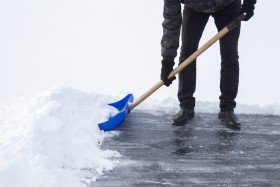Are Landlords or Tenants Responsible for Snow Removal?

The winter months can be treacherous for many reasons. Not only can Michigan get bitterly cold, the snow and ice increases the risk of being injured in a slip and fall accident. Truly anyone can become a slip and fall victim, especially when a reduced amount of daylight makes it harder to see patches of ice on sidewalks and in parking lots.
Generally speaking, if a person is injured by slipping and falling on snow or ice, it’s covered by a concept known as premises liability, which holds property owners responsible if negligence on their part causes injury to another person who is on their property. But what happens if you slip and fall on snow or ice on a rental property? Would the tenant be responsible for the injury or would the property’s landlord be liable?
If you’re injured after slipping on ice or snow on a rental property, it’s best to contact a slip and fall lawyer because determining liability can be more complicated than it would be for accidents on privately owned properties. In this situation, it largely comes down to the lease between the landlord and the tenant. Since not all landlords live near the properties they lease, many people who live or run businesses in rented properties are responsible for their own snow removal. However, there are some cases when the landlord agrees to handle snow removal for the tenant.
Where, exactly, the fall took place can also play a role in liability. For instance, it’s easy for snow to get tracked inside on snowy days and make the floors near an entrance slippery. Who would be liable if you fall on a slippery entrance rather than in the driveway or on a sidewalk? In an apartment complex, for example, the landlord is generally responsible for maintaining common areas of the building and should be taking reasonable steps to prevent wet floors. But if you slipped in a wet entryway that’s inside an individual’s apartment or rented house, the tenant is most likely responsible for taking care of that area.
In the state of Michigan, there isn’t one main statewide law requiring property owners to clear the snow and ice from their sidewalks and walkways. Instead, those are established on a city-by-city basis, so if you have any questions about the snow removal laws in your city, contact the city hall in your city for more information. And if you’re a renter who isn’t sure if you’re responsible for snow removal, now is a good time to review the details of your lease or get in touch with your landlord.
Talk to a Michigan Slip & Fall Lawyer
If you’ve been injured in a slip and fall accident involving ice or snow, don’t hesitate to contact a lawyer. Goodwin & Scieszka has attorneys experienced in handling Michigan slip and fall cases. Contact us so we can learn more about your case and help you figure out which steps to take next.






